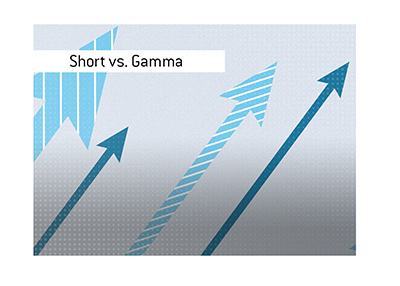Recent Stock Moves Have People Wondering Where the Difference Lies
 The recent moves in stocks such as Gamestop and AMC have brought some new terms into the lexicon of the casual investor/trader, namely these two terms:
The recent moves in stocks such as Gamestop and AMC have brought some new terms into the lexicon of the casual investor/trader, namely these two terms:1. Short Squeeze
2. Gamma Squeeze
Both of these things can be responsible for a stock greatly increasing in value over a short period of time, and they almost always work together in tandem to create explosive moves.
These two things, though, are very different.
Let's look at the difference between the "short squeeze" and the "gamma squeeze":
1. Short Squeeze
When you buy a stock at your brokerage, the shares are held in "street name". This means that the brokerage is holding these shares on your behalf, but they aren't actually registering the shares in your name.
These shares can be lent to short-sellers, who are looking to profit from the shares falling in value.
I borrow some of your shares and immediately sell them. I am bound to return these shares to you. I will pay you interest (usually split between the broker and the client) to borrow these shares - the "borrow fee" can range from practically nothing (say, 0.3% per year) to over 1,000% in some cases.
Now, let's say that there is a stock that appears as though it is going to go out of business. Short sellers continue to make bets that the price will drop, and soon there are millions and millions of shares that are "short".
Let's say that this stock is $10, and let's say that the company announces some good news. The stock goes up to $15.
In order to exit their "short" positions, these short-sellers must "cover" their shares. This means that they have to buy them back in order to return the borrowed shares to you (remember, they sold your shares).
Imagine that I borrowed your collector Corvette that was worth $75,000. I believed that the price of the Corvette was going to drop because I guessed that there was a much higher supply of these cars in the world than previously thought. You decided to charge me $2,500 per month in exchanging for borrowing the vehicle.
I go down to the local dealer and sell the car for $75,000.
Six months later, the price of the car drops to $50,000. I buy the car back for $50,000 and drop the keys off at your house. After paying your $15,000 fee for borrowing the car ($2,500 x 6), I end up pocketing $10,000 in profit.
Now, what happens if the price of the Corvette starts to RISE? Well, I might start to panic and try to buy the car back at a loss, as I HAVE to return it to you.
I go to the dealership and am quoted a price of $95,000, due to increased demand. I decide to hold off.
It turns out that a number of other people did the same thing as me - sold the borrowed car, hoping to make a profit as its value fell.
Now, in addition to the legitimate increased demand for the car, all of these car short-sellers are looking to buy the car back.
This creates a "squeeze", which increases the value of the car.
This is what happens in the stock market - as the price goes up, short-sellers capitulate and buy their shares back in order to get out of their short positions.
This is rocket fuel for the stock - in addition to the legitimate demand for the stock from longs, short-sellers are trying to cover their positions as well. This creates more and more buying pressure, and this puts more and more pressure on short-sellers as the stock rises.
This is the "short squeeze".
2. Gamma Squeeze
The gamma squeeze involves the somewhat complicated world of options.
Let's say that you are bullish on Gamestop. The stock is trading at $30, and you decide to buy $50 calls that expire in a month.
Somebody is selling you the options that you are buying. In many cases, the person on the other side of the trade is a "market maker".
The "market maker" is essentially selling to people who want to buy, and buying from people who want to sell. The market maker makes their money mostly from the "spread", which is the difference between the best selling price and the best buying price.
Now, market makers don't like taking on unlimited risk by selling a bunch of options. So, they will hedge their positions by buying shares of the common stock.
The "Delta" of an option is the amount that the option goes up or down relative to the move in the underlying stock.
So, if the Delta of a call option is 0.30, this means that the option will move up 30 cents for every dollar that the stock moves up.
Market makers hedge their call sales using the "Delta" of the option. The higher the Delta, the more shares that the market maker will need to buy if they have sold options.
Now, the "Gamma" is the rate of change for a Delta. As the stock moves up, the call option will be closer to being "in the money", and the Gamma will increase. This isn't that important for you to understand.
What IS important to understand, however, is that if a market maker sells an "Out of the Money" call and the stock moves up, the market maker will need to buy more and more shares to hedge their position. As the gamma rises, the number of shares that the market maker buys will increase as well.
So, if you buy a $1,000 call option in Tesla when the stock is at $500, the market maker will need to buy more and more shares as the stock goes up to $600, $700, $800, $900 and eventually $1,000.
This is due to the gamma increasing.
This is called the "Gamma Squeeze".
-
You can see how these two things, the short squeeze and gamma squeeze, work together.
Investors get very bullish on a heavily shorted stock and start to buy common shares and calls in droves.
As the stock rises, short sellers will get pressured, market makers will buy more and more shares to properly hedge their positions, and bulls will get more and more bullish.
This creates a positive feedback loop - buyers buy, market makers hedge, short-sellers buy back shares to get out of their short positions.
-
In the case of a stock like Gamestop, the moves can become very violent due to the very large short positions, the extreme bullishness of the investing community and the need for market makers to hedge their call sales.
Filed under: General Knowledge



